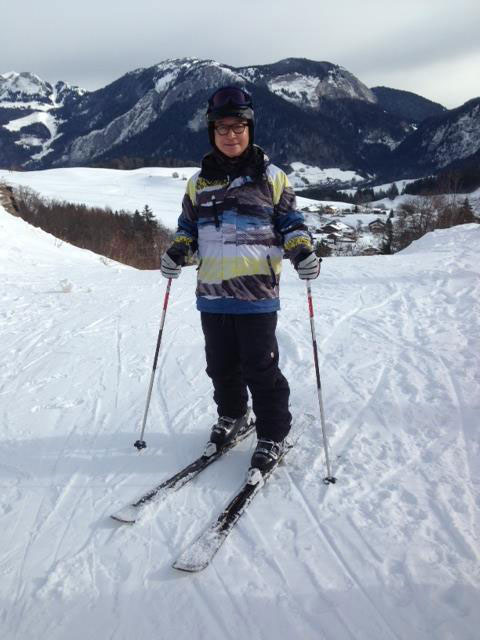Late last month, protesters calling for the release of 23 imprisoned workers and activists clashed with district security guards on Phnom Penh’s Norodom Boulevard.
Batons, rocks and punches were thrown, and a handful of people on both sides were left bruised and bloodied.

Later that week, opposition leader Sam Rainsy posted video and photos to his Facebook page showing him skiing down a gentle slope amid the snow-covered alpine mountains of Switzerland.
“Preferring helmets and batons in Switzerland [rather] than in Cambodia,” one Facebook user commented dryly, referring to the opposition leaders ski equipment.
“The country is having problem, CNRP president Sam Rainsy was skiing and happy. How can we trust [him] if Mr. president has an idea like that?” wrote another.
“He has sacrificed a lot of his time for the country,” retorted another Facebook user. “He deserves some fun time when going through all the stress in politics.”
Mr. Rainsy had lobbied at garment factory gates on the dusty outskirts of Phnom Penh in December urging workers to strike for a higher minimum wage. But, with 21 of those protesters now in jail awaiting trial, the CNRP’s absence from rallies to have them freed is more than a little noticeable.
And even when Mr. Rainsy has been in the country, the CNRP has been notably absent from marches and rallies to help free the original 23 strike protesters.
CNRP leaders have not joined civil society marches over the past three weeks delivering petitions to foreign embassies calling for the release of the prisoners. And at the Court of Appeal on Tuesday, where 21 of the detainees were once again denied bail, CNRP lawmaker-elect Ho Vann made only a fleeting appearance.
“I have seen the CNRP’s activities have quieted down…since [the government] has been detaining activists,” said Tep Vanny, a prominent land rights activist who has been at the front of “Free the 23” rallies and marches.
The CNRP’s absence was not likely by accident, Ms. Vanny maintained.
“[The CNRP] might have a secret activity or strategy to find justice for them,” she said.
Thida Khus, an NGO director who has led a number of marches petitioning embassies and U.N. offices for support in securing the release of activists and workers, said that civil society and the CNRP faced a “dilemma” in organizing their activities over the past month.
“If [the CNRP] gets involved, they are able to bring in more people,” she said. “But since we are all under very close scrutiny from local authorities, we [civil society representatives] are able to do things to bring more awareness and get the point across to stakeholders.”
Mr. Rainsy admitted that the CNRP was keeping its distance from efforts to pressure the government into freeing the protesters who were arrested during the government’s lethal suppression of demonstrations on January 2 and 3.
“We don’t want to be seen as making the decisions or taking the lead because there have been accusations by the CPP that everybody opposing the government or asking something from the government are manipulated by CNRP,” Mr. Rainsy said on Wednesday.
“So we don’t want to give any credence to those allegations.”
Mr. Rainsy said that the CNRP was allowing civil society to take the lead in pressuring the government to “Free the 23.”
“Sometimes the CNRP, when it comes to big demonstrations, we will take the lead,” Mr. Rainsy said. “But when it is more appropriate for a better image, an image of independence for trade unions and civil society organizations…it is not timely for us to be seen as being on the front lines.”
CNRP lawmaker-elect Son Chhay last week joined a delegation of CNRP leaders who attempted to visit the 23 prisoners in Kompong Cham province’s high-security Correctional Center 3.
Mr. Chhay, arguing for the value of the CNRP joining the CPP-led National Assembly, said that he wished the party could lobby for the 23 from inside parliament.
“I was really disappointed that we cannot do much for them,” Mr. Chhay said.
“I would be much more active if I were an actual member of parliament. I would write letters. I would work hard to see them in prison. But since we stay outside parliament, legally we can’t do very much about it.”



